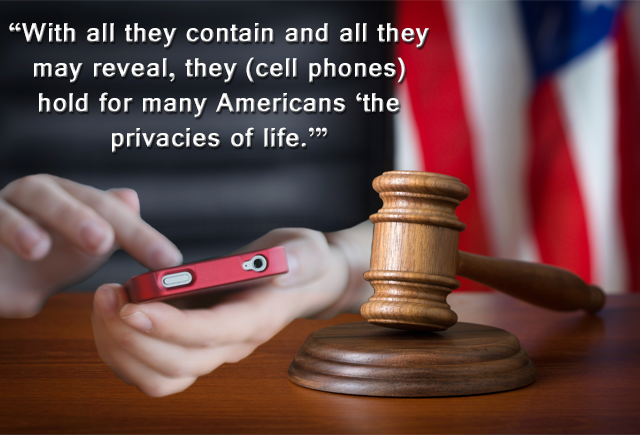The US Supreme Court in Riley v. California, 573 U.S.__(2014) unanimously decided that searches and seizures of the digital contents of cellular devices without valid search warrants are contrary to the constitution and deemed illegal. In the day and age of digital information including photos, videos, texts, voice texts and whatever the new form of digital communication the kids are using now, the Court’s decision in Riley is nothing short of groundbreaking. And the fact that the decision was unanimous means the Court was sending a strong and unified message that we all have important privacy interests in the digital data on our electronic devices and that valid search warrants based upon probable cause are required just like any other property we may own.
In Riley, a California resident by the name of David Riley was pulled over for having an expired license plate. After running Mr. Riley’s information through the BMV, it was determined that he was also driving with a suspended license. The officer then pursuant to a lawful arrest searched Mr. Riley’s person and inventoried the car to be towed to the police lot. While performing an inventory of the vehicle, officers found two handguns under the hood of the vehicle and one of the guns had ties to a gang related murder (not known to the officers at the time). Pursuant to a lawful arrest at the time for the driving without a license charge as well as the unlicensed firearms, the officers conducted a search of Mr. Riley’s cellular phone without a valid search warrant. The search included uploading pictures, videos, text messages, call log and contact directory and uncovered evidence that Mr. Riley was a member of a gang that had ties to the weapons found in the car. Based on this evidence, the Sate charged Mr. Riley with enhanced crimes involving the gang activity and the shooting that occurred with the gun found in his car. Mr. Riley’s defense attorney sought to suppress the cell phone evidence but the trial court denied the suppression and he was ultimately found guilty. The appellate court affirmed the conviction.
The ultimate issue that the US Supreme Court had to decide was weather we as US citizens have privacy rights to the digital contents of our electronic devices. If we did, then a search warrant based on probable cause would be necessary to search or seize such property pursuant to the 4th Amendment to the US Constitution. Obviously the Court unanimously agreed that we do possess a privacy interest in our digital data, and what I would consider the greatest line in the opinion, Chief Justice Roberts stated that following:
“Modern cell phones are not just another technological convenience. With all they contain and all they may reveal, they hold for many Americans “the privacies of life”. The fact that technology now allows an individual to carry such information in his hand does not make the information any less worthy of the protection for which the Founders fought.”Riley v. California, 573 U. S., (slip op., at 28)
In summary, for the first time in our history, the Supreme Court recognized that our electronic devices are more than just that, they are digital gateways and vessels that lead directly to our most private and intimate personal lives. They hold bank accounts and passwords, photographs and videos, text messages and emails that no government entity should have the unchecked power to peek into without a search warrant indicated that the government has probable cause to believe that such personal information was used in the commission of a crime. If you or someone you know has been charged with a crime and believe your Constitutional rights have been violated in some way, you need an experienced litigator knowledgeable in 4th Amendment search and seizure law to assist you in your time of need. Kevin Potts is here to help. Call today: 317-951-0087


